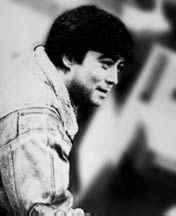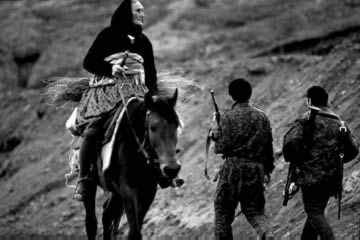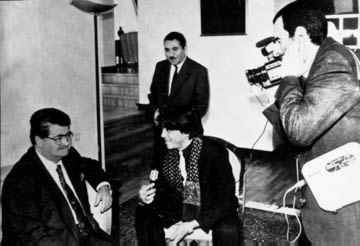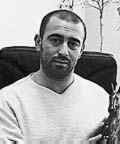|

Autumn 1999 (7.3)
Pages
57-59
Documenting
the Horrors of Karabakh
Chingiz
Mustafayev in Action
by Vahid
Mustafayev
See articles about Khojali
by Thomas Goltz:
Khojali: Eyewitness
Account From the Following Day (1992) (AI 10.1, Spring 2001)
Khojali: A
Decade of Useless War Remembered (AI 10.1, Spring 2001)
Khojali:
Facts
(AI 13.1, Spring 2005)
Khojali:
13
Years Later: Remember, But Be Sure to Preserve Your Souls
(AI 13.1, Spring 2005)
Khojali: How
to Spell "X-O-J-A-L-I"? (AI 10.1, Spring 2001)
Also:
Khojali: Quotes: Never
Forget Khojali and other Massacres by Photographer Reza (1999)
Khojali:
Finally
Documented in U.S. Congressional Record by Dan Burton (AI 13.1, Spring 2005)
  Left:
Chingiz Mustafayev (1960-1992) was one of Azerbaijan's most noted
journalists, even though the corpus of his work spans less than
a year. With no formal journalistic training, he created a video
anthology of the Karabakh war - an incalculable contribution
documenting the brutality of a war that ultimately snuffed out
his own life. Left:
Chingiz Mustafayev (1960-1992) was one of Azerbaijan's most noted
journalists, even though the corpus of his work spans less than
a year. With no formal journalistic training, he created a video
anthology of the Karabakh war - an incalculable contribution
documenting the brutality of a war that ultimately snuffed out
his own life.
Here Vahid
Mustafayev, who now heads ANS (Azerbaijan News Service), one
of the country's most dynamic television and radio services,
tells about his brother's passion for life and truth.
Most Azerbaijanis think of my brother, Chingiz Mustafayev, as
the man behind the TV camera, who dared to film the Karabakh
town of Khojali
the morning after
it was savagely attacked in February 1992.
Chingiz' footage taken from an army helicopter showed hundreds
of dead bodies strewn across snow-covered fields - innocent victims
who had tried to run away from the surprise attack. Azerbaijan's
official media had covered up the fact that the town had been
wiped out and Armenians had ruthlessly slaughtered women, children
and the elderly. But with Chingiz' film, the evidence was irrefutable.
There had been a full-scale massacre.
  Azerbaijani
woman on a mountain trail in Nagorno Karabakh passing Azerbaijani
soldiers before the region was occupied by Armenian troops. Photo:
Reza, 1992. Azerbaijani
woman on a mountain trail in Nagorno Karabakh passing Azerbaijani
soldiers before the region was occupied by Armenian troops. Photo:
Reza, 1992.
In the course of eight months, Chingiz shot 18 documentaries
about the war in Karabakh, leaving behind a substantial historical
archive. Today, everybody remembers him for his camera work,
but there was really much more to him than that. My brother followed
the beat of a different drummer throughout his entire life and
was passionate about everything he did. In the end, he risked
everything to expose the truth.
A Strict Upbringing
  I
think our family could best be described as rather average or
ordinary. My mom and dad were quite different from each other.
Dad was a military man involved with missiles and rockets. Mom
was from Shaki; they were married when she was 19. Chingiz was
the oldest child, born in 1960, and then my brother Seyfulla
came in 1962. Six years later in 1968, my parents, still hoping
for a daughter, had me. I
think our family could best be described as rather average or
ordinary. My mom and dad were quite different from each other.
Dad was a military man involved with missiles and rockets. Mom
was from Shaki; they were married when she was 19. Chingiz was
the oldest child, born in 1960, and then my brother Seyfulla
came in 1962. Six years later in 1968, my parents, still hoping
for a daughter, had me.
Chingiz Mustafayev (center) interviewing Turkey's President,
Turgut Ozal, in Baku shortly before the President returned to
Turkey and died of a sudden heart attack. April 1993.
In general, you could say that all of us kids had a rebellious
streak. We were quite mischievous, especially Chingiz. Once he
bit another child who, as a precaution, had to get 40 rabies
shots!
When someone in the family had a birthday, the rest of us would
buy presents and leave them on the table as a surprise for the
next morning. Once when it was Mom's birthday, Dad had bought
a large chocolate bear for her. He showed it to us but warned
us not to touch it as he planned to give it to Mom the next day.
The next morning, Dad came out of the bedroom yelling: "Who
ate the bear's ear?" Everybody looked at me since I was
the youngest. But I squealed on Chingiz. I was always telling
on him. Then Chingiz came out of the bedroom with chocolate smeared
all over his mouth.
Chingiz was like an owl. He would work at night and sleep during
the day, and if he ever got into trouble, he knew how to sweet
talk his way out of most situations.
Once I was sitting in the kitchen preparing for the next day's
history class. I was reading about the abolition of slavery.
Chingiz was sitting in the living room, right next to the phone.
It started ringing and he yelled: "Vahid! Vahid!" I
went to see what the problem was and he told me to answer the
phone. That made me mad. I yelled at him: "Am I your slave?
Pick up the phone yourself! Stop insulting and exploiting me!
You are debasing my dignity! We have to fight against slavery."
Chingiz looked at me in astonishment, then picked up the phone
and hurled it at me. It made a deep gash on my forehead which
started bleeding all over the place. At first, Chingiz didn't
know what to do. Then he started hugging and kissing me, saying:
"Please, please. You know how much I love you. Please don't
tell Mom and Dad about this." We washed the wound with soap
and let it go at that. It really should have been stitched up
by a doctor.
An Uncertain Future
Dad wanted Chingiz to be a military man just like he was, so
he enrolled him in Azerbaijan's Military High School named after
Jamshid Nakchivansky. Eventually, he left military school and
entered a regular secondary school.
Then he got admitted into medical school. God knows how he did
it as he wasn't a very ambitious student. Besides, he had no
inclination for chemistry, physics and math. Mom wanted him to
become a doctor; she had always wanted to be one herself.
But as Chingiz wasn't really interested in medicine, he spent
a lot of his time starting up discos and organizing parties rather
than studying. He was an innovator par excellence. In the 1970s,
he opened the first disco in the USSR. In 1983 he was the first
Azerbaijani to perform rap music, even though he didn't have
much of a singing voice. It was a song called: "Yesterday
is Past." Then he opened a little café called Sevinj
(Joy). During the following decade, he also brought new types
of TV programs to Azerbaijani TV such as "Impromptu"
and "Thursday" and organized the "Ganjlik"
(Youth) variety show and the "Ozan" (Ashug) rock group
as well.
After graduating from medical school, he was appointed chief
doctor at the dormitory of the Construction Engineers' Institute.
Actually, it was more like a fashionable hotel - free of charge
- where students could go when they wanted to relax. In six or
seven months, Chingiz transformed the dormitory, adding things
like TV and radio, a bar and a huge, comfortable study area.
Rebel with a Cause
Like any other military family, we were brought up to respect
authority. The law was absolute and you had to obey it. You could
question it but in the end you had to obey it as long as it was
in force. Even to this day, our family doesn't talk about politics.
The one exception was the Karabakh conflict that started in 1988.
In January 1990 when the Soviet troops killed hundreds of people
in Baku, Chingiz used the therapeutic center as a clinic. As
no professional doctors or surgeons worked there, it really wasn't
a hospital, but they did their best to provide emergency care
for the wounded. Chingiz took an enormous risk. Today, it's easy
to applaud his actions and say that he was doing the right thing.
But at that time treating the wounded was illegal as demonstrators
were viewed as "criminals" or "extremists".
Chingiz could easily have been shot. Mom and Dad told him that
the whole family could have been exiled to Siberia for such involvement.
It was these "Black
January"
events that transformed Chingiz into an activist.
At one demonstration, Chingiz started yelling at the soldiers.
Of course they attacked him and threw him in jail. The next day,
he came home with his face bruised and bloody.
Chingiz didn't actually start working as a journalist until November
1991, eight months before his death. I had started two years
earlier working as an Azerbaijani correspondent for the "Vesti"
(News) program on Russian TV. I was also working for "Azerbaijan",
the only independent newspaper in the country at the time.
Even though Chingiz had never formally been trained as a journalist,
soon the Democratic Russia Press Agency gave him papers certifying
that he was a correspondent for them. I laughed when I saw it.
"Oh yeah, you're a real professional now," I told him.
Then he started making contributions to "Vesti", too.
I didn't like him competing with me and asked him not to interfere
with my earning a living. For Chingiz there were more important
things than money. The news from an Azerbaijani perspective had
to get out.
Karabakh Footage
Before long, Chingiz became ABC News' Azerbaijan correspondent.
In journalism, this was an incredible leap to get involved on
an international level so quickly.
Some of his films are classic. For instance, Chingiz once followed
a soldier to the front. Two days later, the soldier was wounded
and taken to the hospital, but the doctors couldn't save his
life and he died. Chingiz captured all of this on camera. The
footage ends with him interviewing the soldier's grieving mother.
In February 1992, Chingiz and I were both assigned to cover Shusha
when the Armenian troops took the city. Shusha was considered
the cultural heart of Karabakh. As usual, Chingiz was having
trouble with his camera. It was always jamming in the middle
of a shoot. But I had my footage and wanted to broadcast it.
Chingiz argued with me, saying that I should wait to do that
as Azerbaijanis might lose courage if they knew what was really
happening. He wanted me to get the approval of the Defense Minister
first.
That next week, the official media reported that the Azerbaijani
Army had reclaimed Shusha. They wove so many
lies into their coverage. I decided to broadcast the real truth
on Azerbaijan News Service (ANS). The news exploded like a bombshell.
People started demonstrating in front of the Supreme Soviet building
after our broadcast. Soon afterward, the Defense Minister called
me and said: "I'll shoot you if you ever go to Karabakh
again." Then his bodyguard beat me up.
There was hardly a battlefront that Chingiz didn't cover. Despite
the fact that he had no formal training, he created an anthology
of 18 films about the war in just eight months! His legacy provides
evidence of the atrocities of this war for future generations.
Even so, Chingiz never received the respect he deserved. He was
a revolutionary, so naturally he stood out from other journalists.
Newspapers wrote nasty things about him, calling him a traitor.
They said that his long hair made him look like a woman. AzTV
fired him because he "lacked discipline."
All of these charges depressed Chingiz. He couldn't understand
why he was being treated this way since everything he did was
for his nation. He felt he didn't deserve such criticism. In
Karabakh, however, he was like a fish in water-he had found his
own element.
One Last Film
The last time we were together was in June 1992 in Nakhchivanik,
a village south of Agdam. I told him we should leave. He said
that no, he was staying. I argued with him: "Listen, we
both have plenty of footage. We have enough film to show everyone
what's happening here. Let's go." But Chingiz wouldn't budge:
"No, I'm staying. I want to go to nearby Shaumyan village
tomorrow and shoot more footage." So he stayed and I headed
to Moscow carrying my film.
When I arrived there, one of my Russian friends told me that
Chingiz had been killed. I couldn't believe it. I had just been
with him the day before. But he insisted that it was true. I
went to the Azerbaijan Embassy to call the Defense Minister.
He confirmed my greatest fear: Chingiz was dead.
When Seyfulla and I showed up at the Zabrat Airport in Baku to
take Chingiz' body, one of his "friends" from AzTV
was there as well. We thanked him for coming. "I'm here
for the camera," he replied, took the camera and left. I
didn't have much money at the time, but I offered him everything
I had just to hang onto that equipment which had been so special
to Chingiz. But he wouldn't give it to me. He said that they
would open a museum and put the camera on display there. I later
learned that it was taken and used at a private wedding where
it got broken.
It turns out that Chingiz had not gone on to the village as he
intended. On his way back to Agdam, one of the battalions had
stopped him. The soldiers had taunted him: "You just show
up, take your pictures and run off. You're just showing off.
If you're a real man, come and shoot the front."
So Chingiz had returned to Nakhchivanik with the battalion. This
army unit was especially inept in their operations. Our soldiers
had taken the village back, but the surrounding mountains were
swarming with Armenian soldiers.
To show off in front of the camera, the soldiers started shooting
their guns into the air. Soon, the Armenians replied with mortar
fire. I've watched Chingiz' last footage many times and now I
realize what he was trying to do. He wanted to show how a mortar
explodes. Several times, he jumped out of the trench trying to
get a better angle. You can even hear his voice on the tape,
saying: "Too late. I missed it." The last time he tried
it, a shell exploded right beside him and knocked him to the
ground.
A splinter from the shell had severed one of his major arteries.
The stupid soldiers removed the shell and the blood gushed out.
There was no doctor around so they had to rush him to Agdam,
20 kilometers away. Chingiz was still alive when they arrived
at the hospital but as they lifted him onto the operating table,
his heart stopped.
When Chingiz was wounded, one of the soldiers stole his pistol.
I promised Mom that I would find that pistol and bring it back
to her. For days, I traipsed all over the country in search of
it. At last, I tracked it to Sumgayit near Baku. By the time
I found the guy, I was so angry I could have killed him. He tried
to excuse himself by saying that he was planning to give it back.
I took it from him and brought it back to Mom 39 days after Chingiz'
death.
Chingiz is truly a National Hero of Azerbaijan. I say that not
just because he was my brother. He taught me to love life, to
love my Motherland and to embrace worthy ideals. He also taught
me how to die. Of course, a lot of people have come and gone
during this century. But Chingiz was at the peak of his activity
when death took him. It takes a special ability and strength
to do that. Not everyone can succeed at that.
  These
days we need Chingiz more than he needs us. People don't believe
that he was just an ordinary guy, but he really was. Ordinary
people need to know that they, too, can become heroes and make
a real difference in the world. These
days we need Chingiz more than he needs us. People don't believe
that he was just an ordinary guy, but he really was. Ordinary
people need to know that they, too, can become heroes and make
a real difference in the world.
Left: Vahid Mustafayev is President of ANS (Azerbaijan News Service)
Concern, which includes both ANS Radio and ANS Television.
From Azerbaijan International
(7.3)
Autumn 1999.
© Azerbaijan International 1998. All rights reserved.
Back to Index AI 7.3 (Autumn
99)
AI Home
| Magazine
Choice | Topics
| Store
| Contact
us
|




